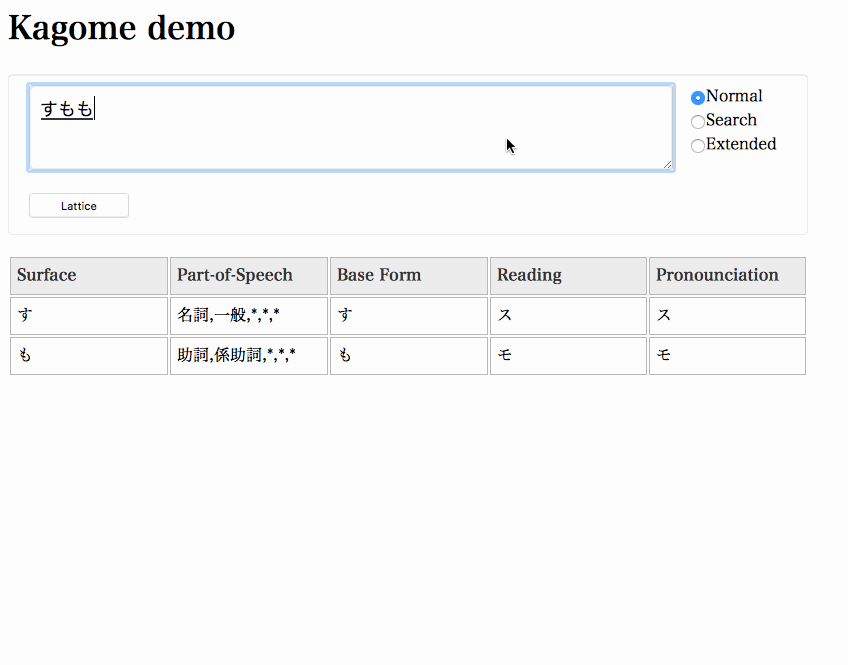kagome alternatives and similar packages
Based on the "Natural Language Processing" category.
Alternatively, view kagome alternatives based on common mentions on social networks and blogs.
-
prose
DISCONTINUED. :book: A Golang library for text processing, including tokenization, part-of-speech tagging, and named-entity extraction. -
gse
Go efficient multilingual NLP and text segmentation; support English, Chinese, Japanese and others. -
universal-translator
:speech_balloon: i18n Translator for Go/Golang using CLDR data + pluralization rules -
locales
:earth_americas: a set of locales generated from the CLDR Project which can be used independently or within an i18n package; these were built for use with, but not exclusive to https://github.com/go-playground/universal-translator -
go-nlp
DISCONTINUED. Utilities for working with discrete probability distributions and other tools useful for doing NLP work. -
segment
A Go library for performing Unicode Text Segmentation as described in Unicode Standard Annex #29 -
go-localize
i18n (Internationalization and localization) engine written in Go, used for translating locale strings. -
gotokenizer
A tokenizer based on the dictionary and Bigram language models for Go. (Now only support chinese segmentation)
InfluxDB - Power Real-Time Data Analytics at Scale

* Code Quality Rankings and insights are calculated and provided by Lumnify.
They vary from L1 to L5 with "L5" being the highest.
Do you think we are missing an alternative of kagome or a related project?
Popular Comparisons
README
Kagome v2
Kagome is an open source Japanese morphological analyzer written in pure golang. The dictionary/statistical models such as MeCab-IPADIC, UniDic (unidic-mecab) and so on, are able to be embedded in binaries.
Improvements from v1.
- Dictionaries are maintained in a separate repository, and only the dictionaries you need are embedded in the binary.
- Brushed up and added several APIs.
Dictionaries
| dict | source | package |
|---|---|---|
| MeCab IPADIC | mecab-ipadic-2.7.0-20070801 | github.com/ikawaha/kagome-dict/ipa |
| UniDIC | unidic-mecab-2.1.2_src | github.com/ikawaha/kagome-dict/uni |
Experimental Features
| dict | source | package |
|---|---|---|
| mecab-ipadic-NEologd | mecab-ipadic-neologd | github.com/ikawaha/kagome-ipa-neologd |
| Korean MeCab | mecab-ko-dic-2.1.1-20180720 | github.com/ikawaha/kagome-dict-ko |
Segmentation mode for search
Kagome has segmentation mode for search such as Kuromoji.
- Normal: Regular segmentation
- Search: Use a heuristic to do additional segmentation useful for search
- Extended: Similar to search mode, but also uni-gram unknown words
| Untokenized | Normal | Search | Extended |
|---|---|---|---|
| 関西国際空港 | 関西国際空港 | 関西 国際 空港 | 関西 国際 空港 |
| 日本経済新聞 | 日本経済新聞 | 日本 経済 新聞 | 日本 経済 新聞 |
| シニアソフトウェアエンジニア | シニアソフトウェアエンジニア | シニア ソフトウェア エンジニア | シニア ソフトウェア エンジニア |
| デジカメを買った | デジカメ を 買っ た | デジカメ を 買っ た | デ ジ カ メ を 買っ た |
Programming example
package main
import (
"fmt"
"strings"
"github.com/ikawaha/kagome-dict/ipa"
"github.com/ikawaha/kagome/v2/tokenizer"
)
func main() {
t, err := tokenizer.New(ipa.Dict(), tokenizer.OmitBosEos())
if err != nil {
panic(err)
}
// wakati
fmt.Println("---wakati---")
seg := t.Wakati("すもももももももものうち")
fmt.Println(seg)
// tokenize
fmt.Println("---tokenize---")
tokens := t.Tokenize("すもももももももものうち")
for _, token := range tokens {
features := strings.Join(token.Features(), ",")
fmt.Printf("%s\t%v\n", token.Surface, features)
}
}
output:
---wakati---
[すもも も もも も もも の うち]
---tokenize---
すもも 名詞,一般,*,*,*,*,すもも,スモモ,スモモ
も 助詞,係助詞,*,*,*,*,も,モ,モ
もも 名詞,一般,*,*,*,*,もも,モモ,モモ
も 助詞,係助詞,*,*,*,*,も,モ,モ
もも 名詞,一般,*,*,*,*,もも,モモ,モモ
の 助詞,連体化,*,*,*,*,の,ノ,ノ
うち 名詞,非自立,副詞可能,*,*,*,うち,ウチ,ウチ
Reference
Commands
Install
Go
go install github.com/ikawaha/kagome/v2@latest
Homebrew tap
brew install ikawaha/kagome/kagome
Usage
$ kagome -h
Japanese Morphological Analyzer -- github.com/ikawaha/kagome/v2
usage: kagome <command>
The commands are:
[tokenize] - command line tokenize (*default)
server - run tokenize server
lattice - lattice viewer
sentence - tiny sentence splitter
version - show version
tokenize [-file input_file] [-dict dic_file] [-userdict userdic_file] [-sysdict (ipa|uni)] [-simple false] [-mode (normal|search|extended)] [-split] [-json]
-dict string
dict
-file string
input file
-json
outputs in JSON format
-mode string
tokenize mode (normal|search|extended) (default "normal")
-simple
display abbreviated dictionary contents
-split
use tiny sentence splitter
-sysdict string
system dict type (ipa|uni) (default "ipa")
-udict string
user dict
Tokenize command
% # interactive mode
% kagome
すもももももももものうち
すもも 名詞,一般,*,*,*,*,すもも,スモモ,スモモ
も 助詞,係助詞,*,*,*,*,も,モ,モ
もも 名詞,一般,*,*,*,*,もも,モモ,モモ
も 助詞,係助詞,*,*,*,*,も,モ,モ
もも 名詞,一般,*,*,*,*,もも,モモ,モモ
の 助詞,連体化,*,*,*,*,の,ノ,ノ
うち 名詞,非自立,副詞可能,*,*,*,うち,ウチ,ウチ
EOS
% # piped standard input
echo "すもももももももものうち" | kagome
すもも 名詞,一般,*,*,*,*,すもも,スモモ,スモモ
も 助詞,係助詞,*,*,*,*,も,モ,モ
もも 名詞,一般,*,*,*,*,もも,モモ,モモ
も 助詞,係助詞,*,*,*,*,も,モ,モ
もも 名詞,一般,*,*,*,*,もも,モモ,モモ
の 助詞,連体化,*,*,*,*,の,ノ,ノ
うち 名詞,非自立,副詞可能,*,*,*,うち,ウチ,ウチ
EOS
% # JSON output
% echo "猫" | kagome -json | jq .
[
{
"id": 286994,
"start": 0,
"end": 1,
"surface": "猫",
"class": "KNOWN",
"pos": [
"名詞",
"一般",
"*",
"*"
],
"base_form": "猫",
"reading": "ネコ",
"pronunciation": "ネコ",
"features": [
"名詞",
"一般",
"*",
"*",
"*",
"*",
"猫",
"ネコ",
"ネコ"
]
}
]
echo "私ははにわよわわわんわん" | kagome -json | jq -r '.[].pronunciation'
ワタシ
ワ
ハニワ
ヨ
ワ
ワ
ワンワン
Server command
API
Start a server and try to access the "/tokenize" endpoint.
% kagome server &
% curl -XPUT localhost:6060/tokenize -d'{"sentence":"すもももももももものうち", "mode":"normal"}' | jq .
Web App

Start a server and access http://localhost:6060.
(To draw a lattice, demo application uses graphviz . You need graphviz installed.)
% kagome server &
Lattice command
A debug tool of tokenize process outputs a lattice in graphviz dot format.
% kagome lattice 私は鰻 | dot -Tpng -o lattice.png

Docker
Building to WebAssembly
You can see how kagome wasm works in demo site.
The source code can be found in ./sample/wasm.
Licence
MIT





